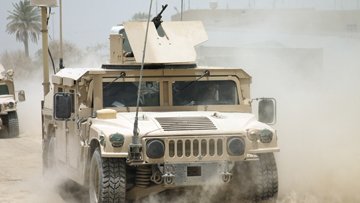You have free articles remaining this month.
Subscribe to the RP Witness for full access to new articles and the complete archives.
When White House officials compare George Bush to Harry Truman, they hope history will give comfort that is missing in the popularity polls. Bush staffer Tim Goeglein took up the Truman analogy in a recent speech in Indianapolis, Ind.
Goeglein, an Indiana University graduate, has one of the longest titles in the federal government: Special Assistant to the President and Deputy Director of the White House Office of Public Liaison. A journalism major, Goeglein worked for Sen. Dan Coats before joining the Bush campaign in 1999.
He thinks the president is not getting due credit for toppling Saddam Hussein in Iraq and launching a campaign for democracy in the Middle East. Bush has taken on a big and maybe impossible challenge: to bring representative government to a region with little cultural background to help accomplish his objective. Israel, a nation where representative government has flourished, is an object of derision and jealousy in the region.
Goeglein is an optimist, though, and sees some parallels with Truman’s postwar battle against Communism. He developed the Truman-Bush analogy in an informal talk to the Indianapolis-based think tank, the Sagamore Institute.
After World War II, the Soviet Communists had taken over Eastern Europe and were aiming at Greece and Turkey. Communist parties were strong in Italy and France, and China was about to fall to Communism. North Korea was preparing to invade South Korea.
“President Truman acted boldly to resist the Communist expansion,” Goeglein said.
The Marshall Plan helped rebuild Western Europe, especially West Germany, setting the stage for 40 years of east-west economic competition that contributed to the eventual collapse of the Communist totalitarian experiment. Through the Truman Doctrine, the president warned the Soviets of possible military moves against Western Europe. He led the nation into the Korean War.
Truman, in many respects, set the stage for a strong bipartisan anti-communist containment policy. The consensus was lost in the 1970s through the Vietnam War. Yet in the big picture of history, Truman’s containment policies eventually opened the door for Ronald Reagan to put the Soviets on the defensive in the 1980s, leading to the collapse of the empire.
Goeglein suggests that the war against terrorism is similar. “Like the Cold War, we are fighting the followers of a murderous ideology,” he said. “Like the Cold War, our enemies are dismissive of free peoples.”
The analogy with Truman is interesting, because he was a Democrat and was criticized by Republicans for not prosecuting the Korean War more vigorously. “Most wars bog down somewhere in the hard fighting,” Goeglein said. Truman decided not to run for reelection in 1952 because he had become so unpopular. Yet anyone old enough to recall this era will have some memory of the strong differences between Dwight D. Eisenhower and Truman. Ike promised to clean up the corruption that had developed after 20 years of Democratic presidents. He also promised to be harder on communism than the Democrats had been. He presided over an end to the Korean War in a stalemate, giving a freedom in South Korea that opened the door for spiritual revival in later generations.
But 50 years of history help us see that, despite the differences between Truman and Eisenhower, the anti-communist consensus was strong until the four-year Jimmy Carter presidency. Even Carter started a military buildup late in his term, in response to the Soviet invasion of Afghanistan.
So what happens to the Bush-Truman analogy in the 2008 election? Can Republican Sen. John McCain be the Eisenhower war hero? He would come much closer to the model than Hillary Clinton.
